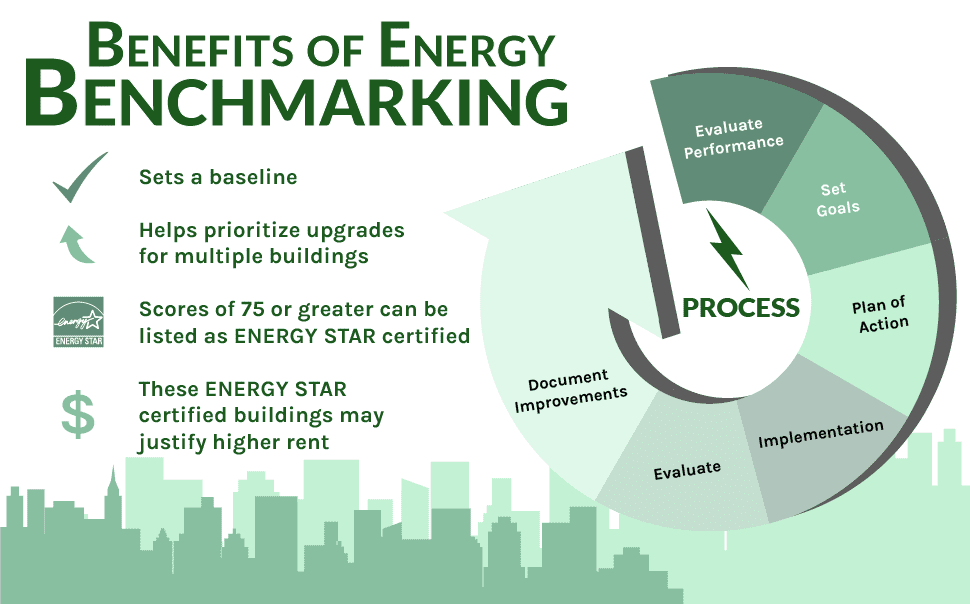
Energy Benchmarking Is A Foundational Element of Developing An Energy Optimization Strategy, Because You Can Not Manage What You Don't Measure.
Energy Benchmarking is a method used to determine whether a building is using more or less energy than its peer facilities with similar occupancies and size. Across many commercial building markets, energy benchmarking has become a standard procedure as energy costs and associated environmental and sustainability issues have raised awareness around the importance of energy optimization management.
For example, major urban areas such as Washington D.C., New York City, Boulder Co, San Francisco CA all have enacted benchmarking and/or disclosure legislation. The hope is that by making it mandatory for building owners and operators to track their energy consumption there will be an increase in awareness of energy usage. This practice is on the rise and changing the way people think about their property's energy use. One of the primary goals of the new regulation is to expand the benefits of energy benchmarking by making buildings’ energy ratings information available to the public as well as potential buyers and tenants.
So, what are the major benefits of energy benchmarking? Let’s break them all down together.

Benefits of Energy Benchmarking
Establishes a Baseline:
Information collected by measuring a buildings energy performance for a minimum of 12 months (through the analysis of utility loads) will establish a baseline. The baseline allows the building personnel to assess the performance, compare to buildings of like size and use and will serve as a starting point for setting energy efficiency performance goals. It will also establish a basis for trending future performance.
Cost Savings:
A recent study by the United States’ Environmental Protection Agency points to the fact that, on average, buildings that are taking advantage of energy benchmarking consistently use approximately 2.4% less energy than those that are not. Research (1) shows that commercial buildings waste 30% of their energy. Owners who have benchmarked their buildings are more focused on energy consumption and cost. With the baseline established business owners/operators can take advantage of cost-reduction strategies ie: reducing load during peak hours and reducing set points on Air-handlers, chillers and boilers. Supply side savings are also available in optimizing the supply contract structure to optimize the cost based on the load profiles.
Environmental Benefits:
It is a known fact the producing and using electricity more efficiently reduces both the amount of fuel needed to generate electricity and the amount of greenhouse gases and other air pollution emitted as a result. By developing strategies to optimize energy consumption in a facility the added result will be a lower carbon footprint. Implementing the use of the ENERGY STAR database allows facilities to track changes in greenhouse gas emissions compared to the benchmarking base year. Therefore, continuing the benchmarking effort documents the environmental impact of your energy management efforts.
Benchmarking Can Impact Your Bottom Line
When it comes to improvement, performance data can be one of the most powerful and important motivators. Once you know where you are in terms of usage, you can identify what you can improve.
Consider the fact that a recent Department of Energy study indicates “energy performance benchmarking prompted energy efficiency investment in over 60 percent of participants through improved energy management processes, building upgrades and behavioral efficiency projects.”
In today’s day and age, energy benchmarking has actually been seen to create a bit of competition amongst builders. The truth is that the growing popularity of energy benchmarking has made builders more inclined to find the greenest way to construct and maintain a building possible. Overall, this is good for the planet and good for building owners who are looking to save as much money as possible on their monthly energy bills.
In the end, the ultimate goal and benefits of energy benchmarking is to focus on improving performance and find what ways you can start working towards those goals!
